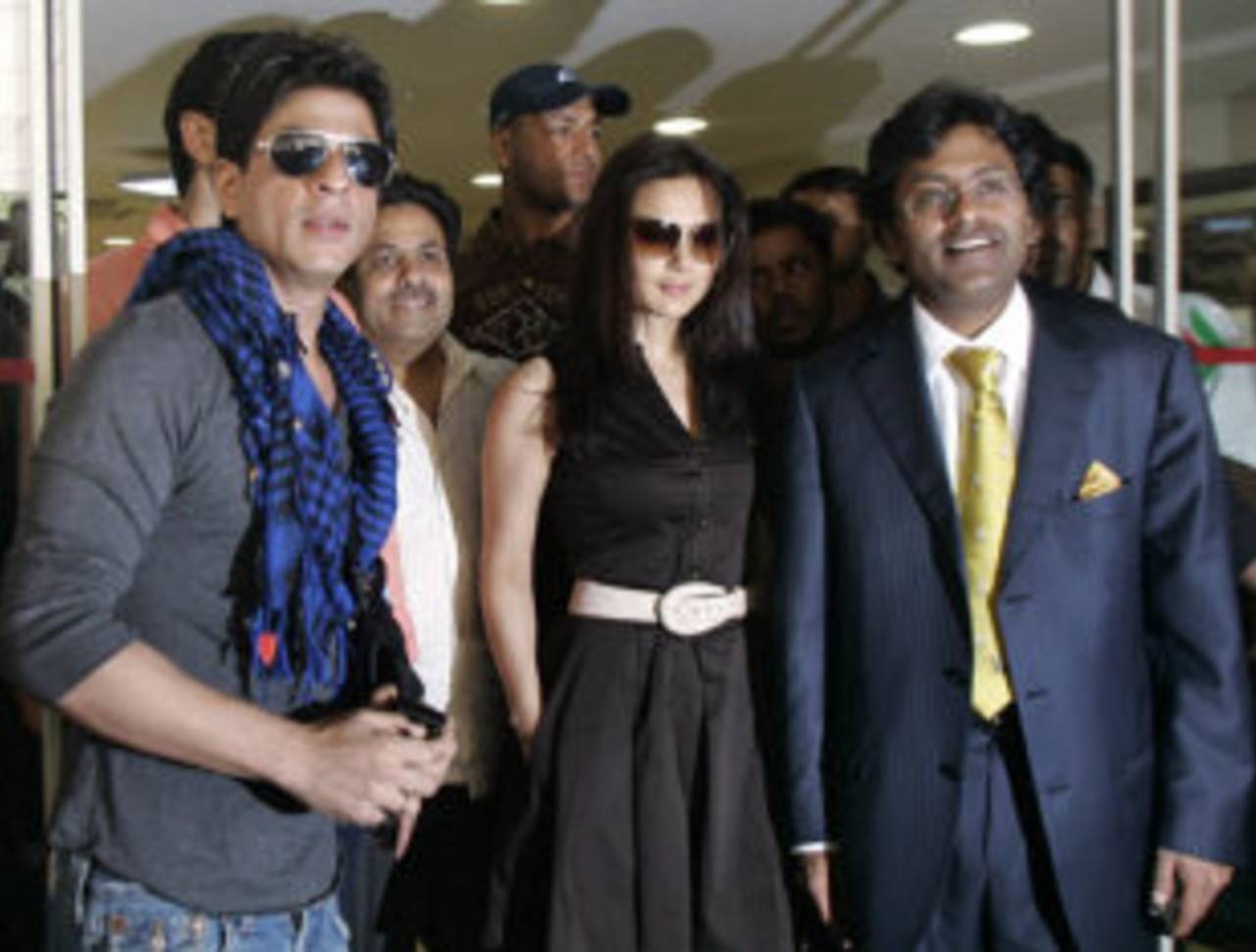The IPL and Lalit Modi
The map of Indian and international cricket was reorganised when a previously unknown BCCI official came up with a franchise-based Twenty20 model
Jayaditya Gupta
Aug 28, 2011, 3:04 AM

Movie stars made it into cricket with the IPL • Associated Press
2007
September 13, 2007. Months before, India had crashed out of the World Cup in the Caribbean and then lost a one-day series to England. The World Twenty20 had just begun in South Africa but India were reluctant participants in an untested format. The mood was despondent, with one question uppermost on everyone's minds: What is cricket's future in India?
The answer came that Thursday evening when the BCCI unveiled the Indian Premier League. The concept's audacity - a franchise-based T20 league involving cities instead of states or provinces, and featuring the world's top players, held over six weeks in April-May - was nothing, however, compared to what followed.
India won the World Twenty20, thanks to a mishit by Pakistan's Misbah-ul Haq. It cemented the format in the public imagination, and shortly afterwards the BCCI announced a slew of deals that would break all financial records. The TV rights deal brought in more than $1 billion, followed by the auction of franchises for $700 million. The first players' auction, in February 2008, saw MS Dhoni signed up for $1.5 million for a six-week season - or around $100,000 per game. Two players would top that figure the next year.
The IPL proper began with Brendon McCullum hitting 158 off 73 balls, then and now the highest ever individual Twenty20 score. When the cricket flagged, Bollywood took over - three franchise owners were A-listers, a fourth joined in season two - with cheerleaders as a backing ensemble.
Above all was Lalit Modi, who morphed overnight from a provincial player - ESPNcricinfo's report on the IPL launch had this coy reference: "Lalit Modi, a BCCI vice-president, was named as its convenor" - to IPL Commissioner. He had the style and swagger to match that title, swinging the deals, schmoozing with the stars, scrapping with the media and every perceived opponent.
Soon the IPL became the event, the one every cricketer, umpire and commentator wanted to be part of (it helped that two competitors, the ICL and the Stanford 20/20, fell swiftly by the wayside). Cricket's fixtures calendar was tweaked, with no little help from India's position as the centre of cricket's economy.
The IPL's official stand that international commitments came first for its players didn't stop top cricketers from putting pressure on their own boards to reschedule games that clashed with the league. In 2009, West Indies captain Chris Gayle arrived for an England tour two days before the first Test; West Indies themselves were replacements for Sri Lanka, who pulled out of their England tour so that their top players could play in the IPL. The next year Gayle was one of three top West Indian cricketers to refuse an annual contract with his national board, relying instead on the security of the IPL and other leagues.
By this time, though, the IPL was in meltdown; Modi's enemies were now within the BCCI, which was alarmed at his rapid rise and apparently limitless powers and possibilities. His downfall was swift and dramatic, beginning officially at the prize distribution ceremony following the 2010 final, and his exit sparked the unravelling of the league as we knew it. At the time of writing many of those multimillion-dollar deals are in litigation or under the scrutiny of India's tax police. The 2011 tournament, sans Modi, was decidedly lacking in hoopla, and TV viewership figures took a hit.
And yet the IPL inspires. Australia are to kickstart their own franchise-based Twenty20 league later this year, clearly modelled on the IPL; the Champions League Twenty20, co-owned by the boards of India, Australia and South Africa, is a more stable but no less rich version of its half-brother. These tournaments - and others will follow - have thrown up the possibility of the Freelance Cricketer, who will ply his trade across borders and without any national affiliation.
Misbah's mishit was truly the Shot Heard Around The Cricket World.
Jayaditya Gupta is executive editor of ESPNcricinfo in India